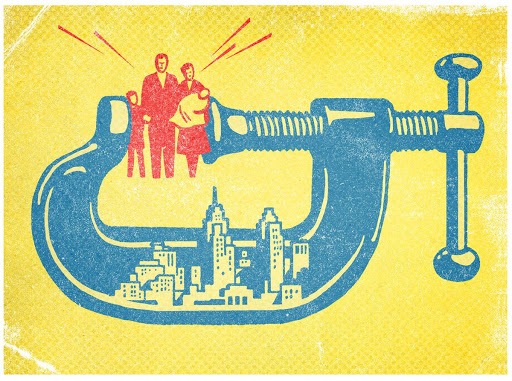Pakistan’s salaried class serves the role of a steadied backbone in our otherwise rough-and-tumble economic life. Their salaries are subject to taxation that offers the slimmest modicum of tax effort in a country with a worryingly small tax base and unsound fiscal health. The salaried class are in fact an easier target for revenue collection than other sources, because they sell their professional labor within an observable and formalized system. Yet the problem with taxing the salaried class excessively is that they offer but a narrow base, and what Pakistan needs is breadth of tax collection, rather than depth – which is to say, one cannot really squeeze the salaried class much further than they already are, above all because salaries in Pakistan do not rise at the same rate as inflation. This is a problem in most emerging markets, but is particularly acute in Pakistan, since our inflation rate remains persistently high, thereby shrinking the buying power of salary-earning households at an increasing rate.
The question of squeezing the salaried class has become a bone of contention between the government and the IMF. As part of its stringent demands, the IMF has prodded the government to consider additional tax impositions for the upcoming FY2021-22 on the already struggling salaried class. It wants the government to extract a further Rs. 176 billion, which would raise the total amount gutted from the salaried class to Rs. 305 billion, more than double the present Rs. 129 billion. The IMF argues that this additional money could help reduce the budget deficit, or be channeled towards development expenditures for the poor – as if the salaried class wasn’t carrying the burden of the poor already, who are unable (not to mention: unwilling) to shoulder the burden of sustaining the nation. It should be noted that the salaried class’ tax burden already shot up in the earlier fiscal year (FY19-20) by a whopping 70%, from Rs. 76 billion to the 129 billion now under discussion.
The government is mindful of the burden placed upon the narrow base of the salaried class, and the Federal Board of Revenue has raised objections to the IMF’s proposal, offering instead a counteroffer of raising the tax burden on the salaried class by only Rs.10 billion, especially given that the inflation rate continues to remain high. The Prime Minister has himself met with IMF officials and insisted that they back away from certain stringent conditionalities, including this but also energy prices and certain types of tax areas including education, agriculture, and healthcare. Yet the resumption of the $6 billion Extended Fund Facility has meant that negotiations are tough. This EFF negotiation is especially dismal when seen in the wider international context where there is too much money sloshing around, unable to earn any returns. The global economy actually has a surplus of dollars pumped in by the large stimulus measures throughout the developed world, particularly the US, and yet Pakistan is having to squeeze its stoic salaried class just to comply with stipulations for a measly $6 billion?
This is not to suggest that the government should not continue with its tax reform efforts. After all, the scope for tax reform is enormous in Pakistan, and some areas where the government is laying emphasis are important ones, such as simplifying the tax code, reducing the numbers of rates, reducing tax credits, decreasing the number of slabs, and increasing progressivity. The Centre for Aerospace & Security Studies (CASS) has worked recently on taxation reform proposals in Pakistan, and so have other research institutions. There is of course much more still that would help make Pakistan’s system conform to the principles of ideal taxation, but that is a bigger project and it certainly doesn’t involve breaking the back of the salaried class. The biggest measure that would help the fiscal architecture would be to expand the tax base in a progressive manner, so that there is less reliance on the slim bracket decent folk who earn salaries that cannot keep up with inflation in any case. Given the weight that the salaried class in Pakistan carries, in fiscal terms relative to other cohorts of the population, they should in fact be given a preferential outlook rather than a discriminatory one.
The writer is the Director for Economics and National Affairs at the Centre for Aerospace and Security Studies (CASS). The article was first published in The Nation. He can be reached at cass.thinkers@gmail.com.
Image Source: Kotkin, Joel, and Wendell Cox. “Elite Cities Are Squeezing out the Middle Class — Straight to More Welcoming Places, like Dallas,” Dallas News, 2 Dec. 2017, www.dallasnews.com/opinion/commentary/2017/12/02/elite-cities-are-squeezing-out-the-middle-class-straight-to-more-welcoming-places-like-dallas/. Accessed 7 May 2021.




